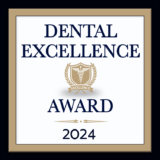
How Estrogen Loss Affects Oral Health
Estrogen plays a vital role in maintaining bone density, regulating moisture levels in the body, and supporting the immune system. As estrogen levels decline during perimenopause, several oral health issues can arise. Here are a few major oral health issues that can emerge:
Increased Risk of Gum Disease (Periodontitis)
Lower estrogen levels can make gums more susceptible to inflammation, increasing the risk of gingivitis and periodontitis. Signs of gum disease include:
- Bleeding gums when brushing or flossing.
- Swollen or tender gums.
- Receding gum lines.
- Persistent bad breath.
If left untreated, periodontitis can lead to tooth loss and even increase the risk of systemic conditions like heart disease and diabetes.
Dry Mouth (Xerostomia) and Increased Cavities
Saliva plays an essential role in washing away bacteria and neutralizing acids in the mouth. With reduced estrogen levels, many women experience dry mouth, leading to:
- Increased plaque buildup.
- Higher risk of cavities.
- A burning sensation or soreness in the mouth.
- White tongue.
- Difficulty swallowing or speaking.
However, there are solutions! Staying hydrated and using saliva-boosting remedies can help combat this issue! Overall, being mindful of the connection between perimenopause and oral health is the first step.
Bone Loss and Tooth Mobility
Estrogen is crucial for maintaining bone density, including the bones that support your teeth. As levels drop, there is an increased risk of osteoporosis, which can cause:
- Jawbone deterioration.
- Loose teeth or tooth loss.
- Receding gums exposing tooth roots.
This makes regular dental check-ups and bone health maintenance more important than ever! Make those appointments as soon as you can!
Protecting Your Oral Health During Perimenopause
While hormonal changes are inevitable, there are effective ways to protect your teeth and gums through proper nutrition, supplementation, and diligent dental care. Let’s take a closer look!
Prioritize a Nutrient-Rich Diet
What you eat plays a significant role in maintaining strong teeth and bones. Focus on:
- Calcium-Rich Foods: Dairy, almonds, leafy greens, and fortified plant-based milks help preserve bone density.
- Vitamin D: Essential for calcium absorption; found in fatty fish, egg yolks, and sunlight exposure.
- Magnesium & Vitamin K2: Work together to transport calcium into bones and prevent deposits in arteries. Found in nuts, seeds, and fermented foods.
- Collagen-Rich Foods: Bone broth and collagen peptides may support gum and jawbone health.
Consider Supplements for Oral & Bone Health
Many women in perimenopause benefit from supplements that support oral and overall health:
- Calcium & Vitamin D: Help to combat bone loss and maintain strong teeth.
- Omega-3 Fatty Acids: Reduce inflammation in the gums and support overall health.
- CoQ10 & Vitamin C: Promote healthy gums and help prevent periodontal disease.
- Probiotics: Support a healthy balance of oral and gut bacteria to reduce cavity causing microbes.
Stay Diligent with Your Dental fRoutine
Because estrogen loss makes teeth and gums more vulnerable, consistent oral hygiene is key:
- Brush twice daily with fluoride toothpaste to strengthen enamel and prevent cavities.
- Floss daily to remove plaque buildup between teeth and prevent gum disease.
- Use a mouthwash designed for dry mouth if needed.
- Stay hydrated to combat dry mouth symptoms.
Don’t Skip Your Bi-Annual Dental Exams
Now more than ever, regular dental check-ups are crucial! At Shorewood Family Dental Care, we help women navigate oral health changes during perimenopause by:
- Monitoring gum health and bone density.
- Addressing dry mouth concerns and recommending treatment options.
- Providing preventive cleanings and periodontal therapy to combat gum disease. A little cleaning and therapy can go a long way!
- Offering personalized guidance based on your specific needs.
Take Control of Your Oral Health Today
Perimenopause may bring hormonal shifts, but you don’t have to let it take a toll on your smile. By focusing on nutrition, supplementation, and professional dental care, you can keep your teeth and gums strong for years to come! The connection between perimenopause and oral health doesn’t have to be so daunting after all!
Schedule your next dental check-up with Shorewood Family Dental Care today! Our team is here to help you navigate these changes and ensure your oral health stays in top shape. Call us today to book your appointment! We truly look forward to hearing from you! “Your smile is your passport to confidence. Keep it sparkling with good oral care!”




